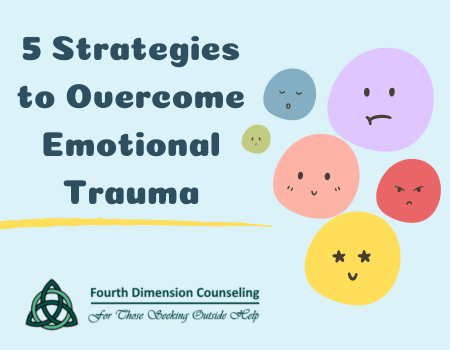Emotional trauma can leave deep scars on our psyche, affecting our mental and emotional well-being long after the initial experience has passed. Whether it stems from childhood trauma, relationship issues, loss, or other life events, the impact of emotional trauma can be profound and enduring. However, with the right strategies and support, it’s possible to overcome emotional trauma and reclaim a sense of peace, resilience, and empowerment. Let’s explore five effective strategies for healing from emotional trauma and rebuilding a sense of wholeness. Additionally, we’ll highlight the importance of professional counseling services, such as those offered by Fourth Dimension Counseling, in navigating the journey toward healing and recovery.
 Acknowledge and Validate Your Feelings
Acknowledge and Validate Your Feelings
The first step in overcoming emotional trauma is acknowledging and validating your feelings. It’s essential to recognize that your emotions are valid and natural responses to your experiences. Allow yourself to feel and express a range of emotions, including sadness, anger, fear, and grief, without judgment or self-criticism.
Seek Support and Connection From Emotional Trauma
Healing from emotional trauma often requires support and connection with others. Reach out to family members, trusted friends, or support groups who will lighten your burden by being understanding, empathetic, and encouraging. Sharing your experiences with others who have faced similar challenges can provide validation and validation and perspective. Additionally, consider seeking professional support from a counselor or therapist trained in trauma therapy, such as those at Fourth Dimension Counseling. Professional counselors can provide a safe and supportive environment for processing emotions, gaining insight, and developing coping strategies.
Practice Self-Care and Self-Compassion
Engaging in self-care practices is crucial for healing from emotional trauma.Prioritize self-care by nurturing your emotional, mental, physical, and spiritual well-being. Practice activities that bring you joy and relaxation, such as meditation, yoga, exercise, or spending time in nature. Be gentle and compassionate with yourself, recognizing that healing is a gradual process that takes time and patience. Treat yourself with the same kindness and compassion that you would offer to a friend in need.
Challenge Negative Beliefs and Thoughts
Emotional trauma can often lead to negative beliefs and thoughts about oneself, others, and the world. Challenge these negative beliefs by questioning their validity and exploring alternative perspectives. Cognitive-behavioral techniques, such as cognitive restructuring, can help you identify and challenge negative thought patterns and replace them with more adaptive and empowering beliefs. Working with a counselor or therapist trained in cognitive-behavioral therapy (CBT) can provide guidance and support in this process.
Cultivate Resilience and Meaning
Building resilience is key to overcoming emotional trauma and moving forward with strength and purpose. Cultivate resilience by focusing on your strengths, resources, and coping skills. Identify lessons learned from your experiences and find meaning and purpose in your journey of healing. Engage in activities that foster resilience, such as setting goals, practicing gratitude, and cultivating a sense of connection and belonging. Remember that resilience is not about avoiding pain or hardship but about embracing life’s challenges and growing stronger as a result.
Importance of Professional Counseling Services
While self-help strategies can be beneficial, navigating the complexities of emotional trauma often requires professional guidance and support. Fourth Dimension Counseling offers specialized counseling services for individuals struggling with emotional trauma, relationship issues, anxiety, depression, and other mental health concerns. Their team of licensed counselors and therapists provides compassionate and evidence-based therapy approaches, including trauma-focused therapy, cognitive-behavioral therapy (CBT), and mindfulness-based techniques. By seeking professional counseling support, individuals can receive personalized treatment tailored to their unique needs, facilitating healing, growth, and transformation.
Overcoming emotional trauma is a journey that requires courage, resilience, and support. By acknowledging and validating your feelings, seeking support and connection, practicing self-care and self-compassion, challenging negative beliefs, and cultivating resilience and meaning, you can heal from past wounds and reclaim a sense of wholeness and well-being. Additionally, professional counseling services, such as those offered by Fourth Dimension Counseling, can provide valuable guidance, support, and resources along the path to healing. Remember that healing is a process, and it’s okay to seek help and support as you navigate your journey toward emotional wellness. For more information or to schedule a counseling appointment, contact our office.
